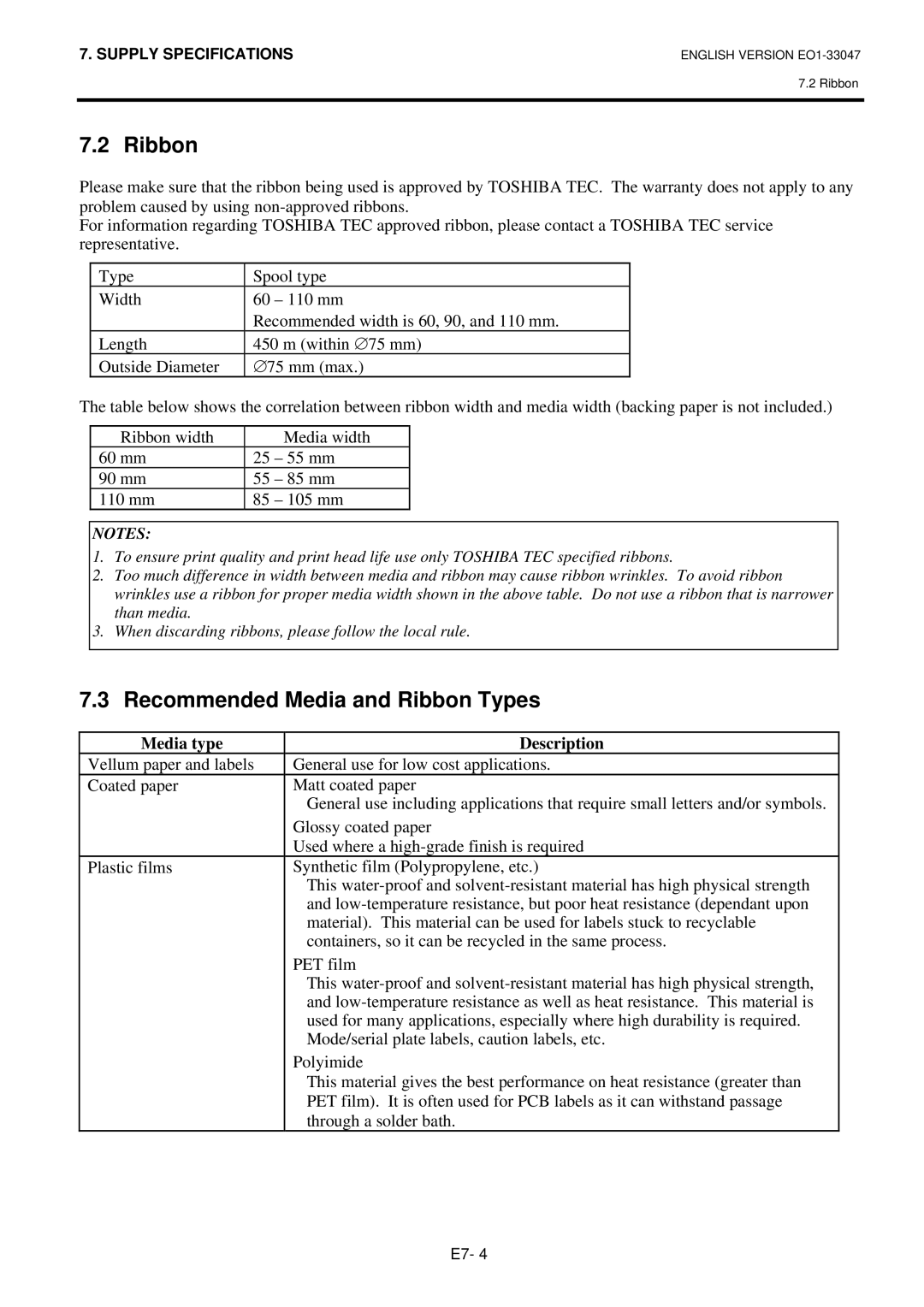SA4TM Series
CE Compliance for EU only
Vorsicht
SA4TM Series
Waste Recycling information for users
Safety Summary
Precautions
Table of Contents
Appendix 3 Power Cord
Troubleshooting
Printer Specifications Supply Specifications
Appendix 1 Messages and Leds
Introduction Features
Product Overview
Accessories
Front View Rear View#
Dimensions
Appearance
IROORZLQJ#FKDSWHUV1#
Operation Panel
Interior
Options
Printer Setup
Installation
Loading the Media
Place the Media Holder Ass’y into the printer
Media Guide
Setting the Feed Gap Sensor position
Setting the Black Mark Sensor position
Batch mode
Press down the Release Bar to open the Strip Unit
Label or Thin media
Loading the Ribbon
# 2SHQ#WKH#5LEERQ#&RYHU1##
Loading the Ribbon
1276=#
Ribbon Cover Top Cover E2-13
Connecting the Printer to Your Host Computer
WKH#5525#/#+5HG,#LV#
Turning the Printer ON#
# 1276=#
UURU#0HVVDJHV1#
$6,&#PRGH1#
7KH#6\VWHP#0RGH#FRQVLVWV#RI#WKH#IROORZLQJ#PHQXV1##
?8!3$1#02# 7KLV#PHQX#LV#XVHG#WR#VWDUW#WKH#SURJUDP#IRU#
# Online
How to Enter the System Mode
Parameter Setting
Pause SA4T
Cont
# ORZ#FRQWURO##
„#Serial RS-232C Interface#
3DULW\#
Baud Rate
Parity
„#Serial RS-232C Interface# Data Length
Stop Bit
$IWHU#PDNLQJ#D#FKRLFH/#SUHVV#WKH#PAUSE#NH\1#
Restart
„ LCD Message Language# Flow Control
RQWURO,#
Feed
$IWHU#PDNLQJ#D#FKRLFH/#SUHVV#WKH# PAUSE#NH\1#
Parameter Setting Cont
„ Web Printer Function when using TCP/IP LAN
127=#
„ Plug & Play#
IP Address Setting TCP/IP
1DIAG
7IP Address
# Restart NH\=#,QFUHPHQW# # FEED#NH\=#HFUHPHQW#
Printer IP Address
# 5DQJH=#3#WR#588#
7KLV#SDUDPHWHU#LV#WR#VHW#D#6XEQHW#0DVN1#
Gateway IP Address
Subnet Mask
# 127=#
7KLV#SDUDPHWHU#LV#WR#HQDEOH#+&31#
Socket Port
Dhcp
XVLQJ#WKH#RESTART RU#
# +H#FRGH1##
Dhcp Client ID
7KLV#SDUDPHWHU#LV#WR#VHW#D#+&3#FOLHQW#,1#
# HDFK#E\WH#E\#XVLQJ#WKH#
Installing the Printer Drivers
Parallel Interface
Installing the Printer Driver
ELGLUHFWLRQDO#VXSSRUW´#FKHFNER1#
Windows 95/98/Me
3ULQWHUV´#LV#GLVSOD\HG1#
Windows NT4.0
SULQWHU#VHWWLQJV1#
Windows 2000/XP
+KWWS=22EDUFRGH1WRVKLEDWHF1FR1MS2QJ2LQGH1KWPO,#
# USB Interface
## Windows 98/Me
E2-36
E2-37
E2-38
E2-39
# Windows 2000/XP
+8,# 7KH#³$GG#1HZ#+DUGZDUH#LDUG´#GLDORJ#ER#LV#GLVSOD\HG1#
# # E2-41
Finish#EXWWRQ1# #
+7,# &OLFN#RQ#WKH#Yes#EXWWRQ#WR#GHOHWH1###
Uninstalling the Printer Driver
+6,# &OLFN#RQ#WKH#Yes EXWWRQ#WR#GHOHWH1###
+7,# &OLFN#RQ#WKH#Yes EXWWRQ#WR#GHOHWH1###
Adding/Deleting a LAN Port
# Adding a LAN Port Windows 95/98/ME
# Windows NT4.0/2000/XP
Windows NT4.0/2000/XP
# Deleting a LAN Port
127# =#
# Others#
Printer Driver Upgrades#
LQVWDOOLQJ#WKLV#SULQWHU#GULYHU1#
SURSHUWLHV#VHWWLQJV1#
Using the Printer Driver
# 2SHQ#WKH#3URSHUWLHV#VFUHHQ#RI#WKH#3ULQWHU#ULYHU1##
# &RQILUP#WKH#SULQW#WHVW#UHVXOW1#
Print Test
$GMXVWPHQW#
# When using an optional Cutter Module or Strip Module
Online SA4T
Position and Print Tone Fine Adjustment
1RESET 3ADJUST SET
# Pause
0FRRUGLQDWH#LQH#$GMXVWPHQW=#
HHG#$PRXQW#LQH#$GMXVWPHQW=#
XW26WULS#3RVLWLRQ#LQH#$GMXVWPHQW=#
7KUHVKROG#LQH#$GMXVWPHQW#+%ODFN#PDUN#VHQVRU,=#
KHQ#VHWWLQJ#.313#PP#
Tone Fine Adjustment
Position and Print
KHQ#VHWWLQJ#.613#PP##
WR#.8313#PP .#
LV#VKLIWHG#IRUZDUG1#
KHQ#VHWWLQJ#.613#PP##
KHQ#VHWWLQJ#±613#PP#
# KHQ#VHWWLQJ#.313#PP#
# KHQ#VHWWLQJ#.613#PP##
±1#PP1#
$%&#
WR#.1#PP .#
KHQ#VHWWLQJ#.8313#PP#
±43#WRQHV1#
43#WRQHV.#
±48#VWHSV1#
PAUSE#NH\1#
#VWHSV.#
SA4T
Threshold Setting
Pause
Transmissive
#1276=#
Online
# WKUHVKROG#VHWWLQJ1#
5SENSOR ADJ
„ When using the Black Mark Sensor
+8,#7KH#GLVSOD\#FKDQJHV#DV#VKRZQ#RQ#WKH#OHIW1##
„ When using the Feed Gap Sensor
#0LGSRLQW# #6159#
SUH0SULQW#ZLWK#WKH#VHQVRU#E\#PLVWDNH1#
„# Storing a No Media Level Voltage #
# 5SENSOR ADJ 3ADJUST SET
„# Manual Threshold Setting#
+8,#7KH#PHVVDJH#UHWXUQV#WR#³?8!61625#$-1´1##
# XQWLO#WKH#WDUJHW#VHQVRU#W\SH#LV#GLVSOD\HG1##
71391#
On Line Operation
Operation Panel
Operation
Reset
UHPDLQLQJ#QXPEHU#RI#PHGLD#WR#EH#SULQWHG1,#
Cleaning
Maintenance
Print Head/Platen/ Sensors
Print Head/Platen/ Sensors Covers and Panels
PRLVWHQHG#ZLWK#PLOG#GHWHUJHQW#VROXWLRQ1##
Optional Cutter Module 1.# 2SHQ#WKH#URQW#&RYHU1##
# 5HPRYH#MDPPHG#PHGLD/#LI#DQ\1#
# #
# 5HPRYH#MDPPHG#PHGLD#RU#EDFNLQJ#SDSHU/#LI#DQ\#
Restart NH\1#
Troubleshooting
Error Messages
RESTART#NH\1##
Restart #NH\1#
Possible Problems
Restart #NH\1##
Removing Jammed Media
# 7XUQ#RII#DQG#XQSOXJ#WKH#SULQWHU1#
Printer Specifications
5RWDWLRQV#
WHP#
$YDLODEOH#IRQW#
6WDQGDUG#LQWHUIDFH#
Supply Specifications
Detection Area of the Transmissive Sensor
Detection Area of the Reflective Sensor
Ribbon
Care/Handling of Media and Ribbon
Symbols in the message
Appendix 1 Messages and Leds
VSHFLILHG#WLPHV1 #
DGGUHVV#
ZDV#GHFRGHG1#
#PRGXOH1 #
DPSOH#5# @#5#3533/#3633/#3783/#4533/#4/#/@#18/@#
127=#HVFULSWLRQ#RI#&RPPDQG#UURU#
DPSOH#4# @#753#*63#/@#18/@#
# &RPPDQG#HUURU# 7KH#IROORZLQJ#PHVVDJH#DSSHDUV1#
Appendix 2 Interface
RQQHFWRU=#
PIN
LQN#/#
$1#FDEOH=#
RQIRUPLQJ#WR#9513#XOO#VSHHG#
$FWLYLW\#/#
DWD#OHQJWK=#
6WDUW#ELW=#
6WRS#ELW#
3URWRFRO=#
76/#+XQLTXH#HQFU\SWLRQ,##
6WDQGDUG=#
$QWHQQD=# KLS#W\SH/#GLYHUVLW\#DQWHQQD##
+$V#RI#6HSWHPEHU#5337,#
Appendix 3 Power Cord
When purchasing the power cord
=# $W#OHDVW/#458#RI#WKH#UDWHG#FXUUHQW#RI#WKH#SURGXFW1#
Appendix 4 Print Samples
Appendix 4 Print Samples
QWHUOHDYHG#5#RI#8#
0DL&RGH#
#&RGH## # # 566047#
45#FRGH#
$145# 326717#
Appendix 5 Glossaries
0HGLD#DQG#ULEERQ#
GHWDLOHG#LPDJH#
WUDQVIHUUHG#RQWR#WKH#PHGLD1#
86%#+8QLYHUVDO#6HULDO#%XV,#
Index
6WULS#PRGH###50/#04/#$805#
7ZR0GLPHQVLRQDO#FRGH###905#
Page
EO1-33047#

